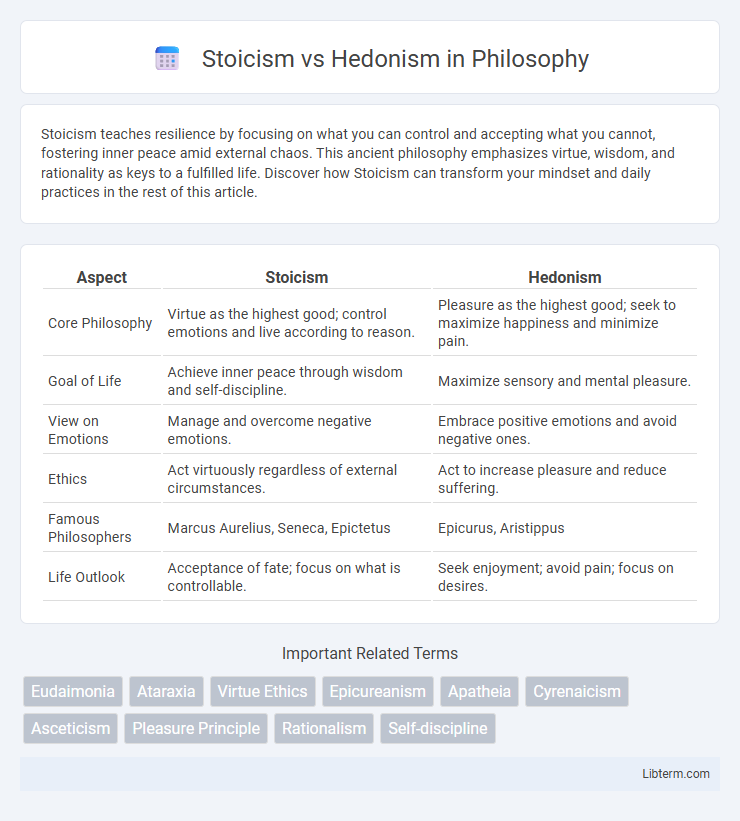Stoicism teaches resilience by focusing on what you can control and accepting what you cannot, fostering inner peace amid external chaos. This ancient philosophy emphasizes virtue, wisdom, and rationality as keys to a fulfilled life. Discover how Stoicism can transform your mindset and daily practices in the rest of this article.
Table of Comparison
| Aspect | Stoicism | Hedonism |
|---|---|---|
| Core Philosophy | Virtue as the highest good; control emotions and live according to reason. | Pleasure as the highest good; seek to maximize happiness and minimize pain. |
| Goal of Life | Achieve inner peace through wisdom and self-discipline. | Maximize sensory and mental pleasure. |
| View on Emotions | Manage and overcome negative emotions. | Embrace positive emotions and avoid negative ones. |
| Ethics | Act virtuously regardless of external circumstances. | Act to increase pleasure and reduce suffering. |
| Famous Philosophers | Marcus Aurelius, Seneca, Epictetus | Epicurus, Aristippus |
| Life Outlook | Acceptance of fate; focus on what is controllable. | Seek enjoyment; avoid pain; focus on desires. |
Introduction to Stoicism and Hedonism
Stoicism is a philosophy founded in ancient Greece emphasizing rationality, self-control, and virtue as the path to true happiness, promoting emotional resilience and inner peace. Hedonism, conversely, centers on the pursuit of pleasure and avoidance of pain as the primary goals of life, prioritizing sensory enjoyment and immediate gratification. These contrasting philosophies offer foundational perspectives on how individuals define and achieve well-being.
Origins and Historical Background
Stoicism originated in early 3rd century BCE Athens, founded by Zeno of Citium, emphasizing virtue and rationality as the path to eudaimonia through acceptance of fate. Hedonism has roots in ancient Greek philosophy as well, notably developed by Aristippus of Cyrene in the 4th century BCE, advocating pleasure as the highest good. Both philosophies reflect central debates in Hellenistic thought regarding the nature of happiness and the best way to live.
Core Principles of Stoicism
Stoicism emphasizes virtue, wisdom, and self-control as the path to true happiness, advocating acceptance of fate and focusing on what is within one's control. It teaches the importance of rationality and emotional resilience, encouraging individuals to maintain inner peace despite external circumstances. Unlike Hedonism, which prioritizes pleasure and avoidance of pain, Stoicism values enduring hardship with dignity and aligning one's life with nature and reason.
Fundamental Tenets of Hedonism
Hedonism centers on the pursuit of pleasure and the avoidance of pain as the primary goals of life, emphasizing sensory enjoyment and emotional satisfaction as essential to well-being. It asserts that maximizing personal happiness through immediate gratification is the ultimate moral value, often advocating for indulgence in physical and mental pleasures. This philosophy contrasts with Stoicism's emphasis on virtue and rational control over desires, highlighting hedonism's focus on experiential joy and the fulfillment of desire as fundamental tenets.
Key Philosophers and Influences
Stoicism, founded by Zeno of Citium, emphasizes virtue, reason, and self-control, with key philosophers including Epictetus, Seneca, and Marcus Aurelius, who shaped its focus on inner tranquility and resilience. Hedonism, notably advanced by ancient thinkers like Epicurus and Aristippus, centers on the pursuit of pleasure and avoidance of pain as the highest good, influencing modern ethical discussions on happiness and wellbeing. Both philosophies have profoundly impacted Western thought through their contrasting views on how to achieve a fulfilling life.
Pursuit of Happiness: Stoic vs Hedonist Approach
Stoicism advocates for happiness through virtue, self-control, and acceptance of what cannot be changed, emphasizing inner tranquility over external pleasures. Hedonism prioritizes maximizing pleasure and minimizing pain, viewing happiness primarily as the accumulation of joyful experiences. While Stoics seek lasting contentment via rational mastery of desires, Hedonists focus on immediate sensory satisfaction.
Attitude Toward Pleasure and Pain
Stoicism advocates for rational control over emotions, viewing pleasure and pain as external events that should not disturb inner tranquility. Hedonism prioritizes the pursuit of pleasure and the avoidance of pain as the highest goods, emphasizing sensory and emotional experiences. While Stoicism seeks apathy toward pleasure and pain to maintain virtuous living, Hedonism embraces these sensations as central to human happiness.
Ethical Implications and Moral Values
Stoicism emphasizes virtue, self-control, and rationality as the foundation of ethical behavior, advocating for living in accordance with nature and accepting fate with equanimity. Hedonism prioritizes the pursuit of pleasure and avoidance of pain as the highest moral good, often valuing immediate gratification and personal happiness. The ethical implications of Stoicism promote resilience and moral integrity, while Hedonism raises questions about long-term well-being and the potential risks of excessive indulgence.
Modern Relevance and Practical Applications
Stoicism offers practical tools for emotional resilience and stress management by promoting rational control over impulses and focusing on what can be controlled, making it highly relevant in today's fast-paced, uncertain environment. Hedonism emphasizes maximizing pleasure and minimizing pain, which aligns with consumer-driven lifestyles and the prioritization of immediate gratification in modern society. Both philosophies inform contemporary approaches to well-being, with Stoicism supporting mindful decision-making and Hedonism highlighting the importance of personal happiness and self-care.
Stoicism vs Hedonism: Which Path to Fulfillment?
Stoicism advocates for fulfillment through virtue, self-control, and acceptance of fate, emphasizing inner peace and resilience against external circumstances. Hedonism, by contrast, pursues fulfillment via pleasure maximization and avoidance of pain, prioritizing sensory enjoyment and immediate satisfaction. Choosing between Stoicism and Hedonism depends on whether one values long-term emotional stability and ethical living or seeks short-term happiness and physical gratification.
Stoicism Infographic

 libterm.com
libterm.com